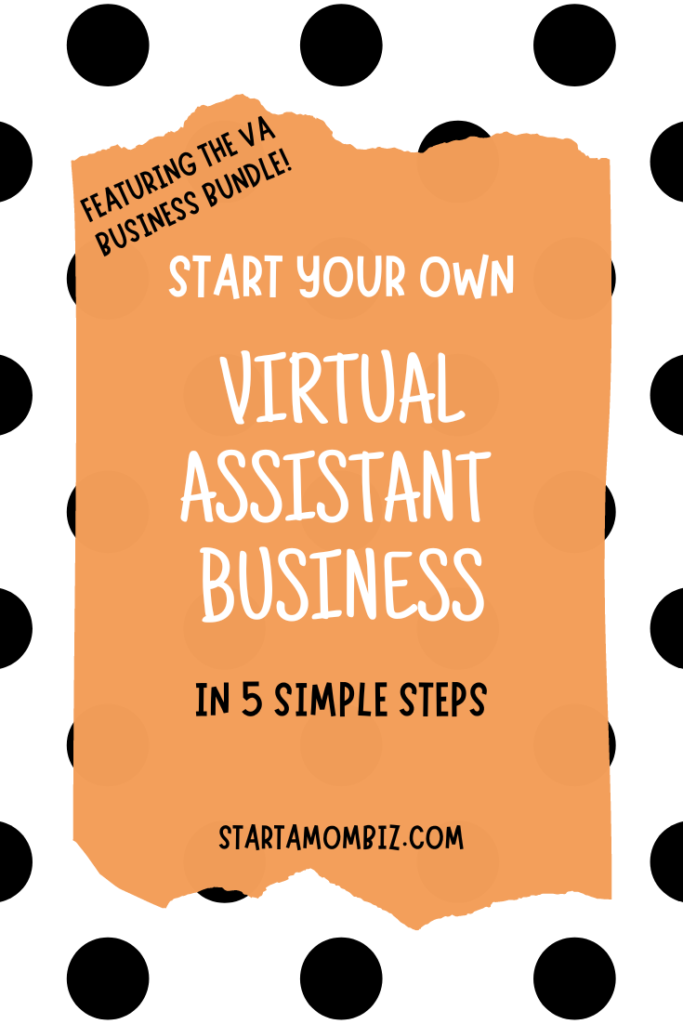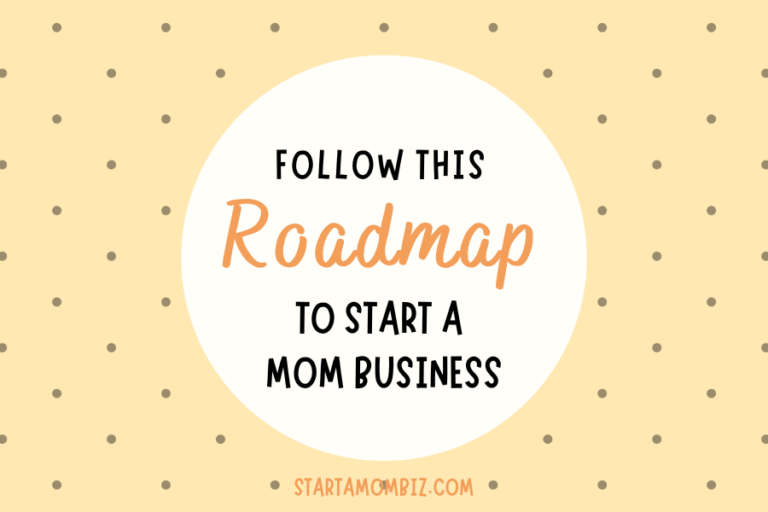5 Steps to Starting a Successful Virtual Assistant Business
Are you a Christian mom who dreams of working from home, putting your family first while building a successful career? If so, keep reading. In this blog post, I’ll guide you through the essential steps to start a VA business, where you can unleash your talents, make a meaningful income, and create the work-life balance you desire.
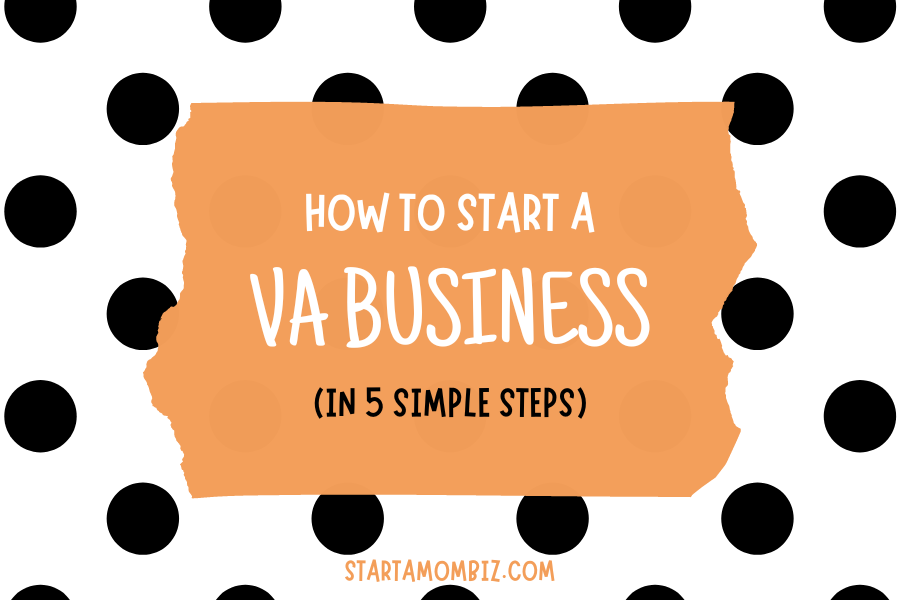
Hey there, mama! Are you tired of feeling overwhelmed and stressed out? Do you wish you could stay home with your kids but don’t know how to make it work financially? If so, you’re not alone. Many moms feel the same way.
The good news is that there is a solution: starting a virtual assistant business. A virtual assistant is a self-employed professional who provides administrative, technical, or creative assistance to clients from a remote location. This means that you can work from home, which is perfect for moms who want to be there for their kids.
You may be wondering, is a virtual assistant profitable? The short answer is, yes. Starting a VA business is a great way to make extra money and have more flexibility in your schedule. It’s also a great way to use your skills and talents to help others. And best of all, you can do it all from the comfort of your own home.
Another common question is, how much does it cost to start a virtual assistant business? Well, keep reading because I’ll answer this and many other questions in this post.
If you’re interested in working as a VA, this blog post will give you the exact steps to start a VA business. We’ll cover everything from choosing a niche to marketing your business. So what are you waiting for? Let’s get started!
Step 1: Choose your niche
The first of 5 steps to start a VA business is to choose a niche. A niche is a specific area of expertise that you will focus on. This will help you to target your marketing efforts and attract clients who are looking for your specific services.
When choosing a niche, there are a few things to keep in mind:
- Your skills and interests: Choose a niche that you are passionate about and that you have skills in. This will make it easier for you to provide high-quality services to your clients.
- The needs of your target market: Consider the needs of your target market when choosing a niche. What are they looking for in a VA? What are their pain points?
- The competition: Do some research to see how much competition there is in the niche that you are interested in. If there is a lot of competition, you may need to find a way to differentiate yourself from other VAs.
There are many different niches that you can choose from, so it’s important to take some time to think about what you’re good at and what you enjoy doing. Here are a few profitable niches for VA businesses:
- Administrative tasks: This includes tasks such as email management, scheduling appointments, creating presentations, and bookkeeping.
- Social media management: This includes tasks such as creating and scheduling social media posts, monitoring social media engagement, responding to comments and messages, and running social media ads.
- Content creation: This includes tasks such as writing blog posts, creating website content, producing videos, and developing marketing materials.
- Web design and development: This includes tasks such as designing and developing websites, creating e-commerce stores, and developing mobile apps.
- Customer service: This includes tasks such as answering customer questions, resolving customer issues, and providing customer support.
- Graphic design: This includes tasks such as creating logos, designing marketing materials, and developing website graphics.
Now that you’ve chosen your niche, it’s time to start developing your skills so that you can be successful.
Step 2: Develop Your Skills
Now, let’s dive into the importance of developing your skills as a virtual assistant. Building a solid foundation of skills is crucial for your success in this industry. Not only will it make you stand out among competitors, but it will also boost your confidence and help you deliver exceptional services to your clients. So, let’s get started!
Why is Developing Your Skills Important?
As a virtual assistant, your skills are what differentiates you from the competition. Clients are looking for someone reliable, knowledgeable, and capable of handling various tasks with finesse. By honing your skills, you position yourself as a valuable asset, increasing your chances of landing clients and building a thriving VA business.
Tips for Developing Your Skills
Take some time to reflect on your strengths and interests. What tasks do you enjoy doing? What are you naturally good at? By focusing on your passions and strengths, you can develop those skills more effectively and enjoy the work you do.
For those wondering, is a virtual assistant profitable, it all depends on you. By developing your skills and setting yourself apart as an expert, you can attract your ideal clients and build a profitable business.
Here are some additional tips to help you build a profitable business and sell yourself as a VA:
1. Set goals for yourself. What do you want to achieve? What skills do you want to learn? If you’re feeling a little insecure about starting a VA business, set a goal to overcome self-doubt so you can start building the business of your dreams.
2. Create a plan. How are you going to achieve your goals? What resources do you need? Your plans should include a morning routine that helps you set a positive tone, boost your productivity, and find a much-needed balance in your day. Also, create a block schedule for greater focus and efficiency.
3. Seek Training and Education: Invest in yourself by enrolling in courses, workshops, or online programs that can enhance your skills. Look for training programs specifically tailored for virtual assistants. These resources provide valuable insights, strategies, and practical tips to excel in your field.
4. Practice Makes Perfect: Put your skills into action! Practice the tasks you want to specialize in, such as social media management, email marketing, or project coordination. Offer your services to friends, family, or local organizations to gain hands-on experience and build your portfolio.
5. Embrace Continuous Learning: The virtual assistant industry is ever-evolving, so it’s important to stay up-to-date with the latest trends and technologies. Subscribe to industry newsletters, follow relevant blogs, and join professional networking groups to stay connected and learn from others in the field.
6. Develop specific skills: these skills are crucial for you to develop if you’re interested in starting a VA business:
- Administrative skills: This includes tasks such as email management, scheduling appointments, and bookkeeping.
- Social media management: This includes tasks such as creating and scheduling social media posts, responding to comments and messages, and running social media ads.
- Content creation: This includes tasks such as writing blog posts, creating website content, and producing videos.
- Customer service: This includes tasks such as answering customer questions, resolving customer issues, and providing customer support.
Resources to Help Develop Your Skills
Online Courses and Platforms: Websites like Udemy, Skillshare, and Coursera offer a wide range of courses on topics such as time management, content creation, customer service, and more. These platforms provide comprehensive learning materials at your own pace.
Webinars and Workshops: Keep an eye out for webinars and workshops hosted by industry experts or VA associations. These events often offer valuable insights, practical tips, and networking opportunities to help you level up your skills. Some of the most popular websites for finding workshops include Eventbrite and Meetup.com.
Books and articles: There are many different books and articles available that can help you develop your skills. Some of the most popular websites for finding books and articles include Amazon and Google Scholar.
Professional Communities: Engage with other virtual assistants through online forums, social media groups, or professional associations. Networking with like-minded professionals can lead to valuable connections, mentorship opportunities, and shared knowledge.
Volunteering: Volunteering is a great way to develop your skills and gain experience. There are many different organizations that are always looking for volunteers. This is how I got my start in social media marketing. I volunteered to help an online community for moms and it eventually led to a full-fledged social media business.
Offering to help out: Offering to help out at local businesses is a great way to develop your skills and gain experience. Talk to your friends, family, and neighbors to see if they know of any businesses that are looking for help.
Remember, developing your skills is an ongoing process. Embrace each opportunity to learn and grow, and don’t be afraid to step out of your comfort zone. The more you invest in yourself and your skill set, the more confident and successful you’ll become as you set up a profitable and fulfilling VA business.
Now, if you’ve been wondering, how do I get VA clients, it’s not as hard as you might think. In the next section, we’ll cover several different ways to market your VA business to attract your ideal clients.
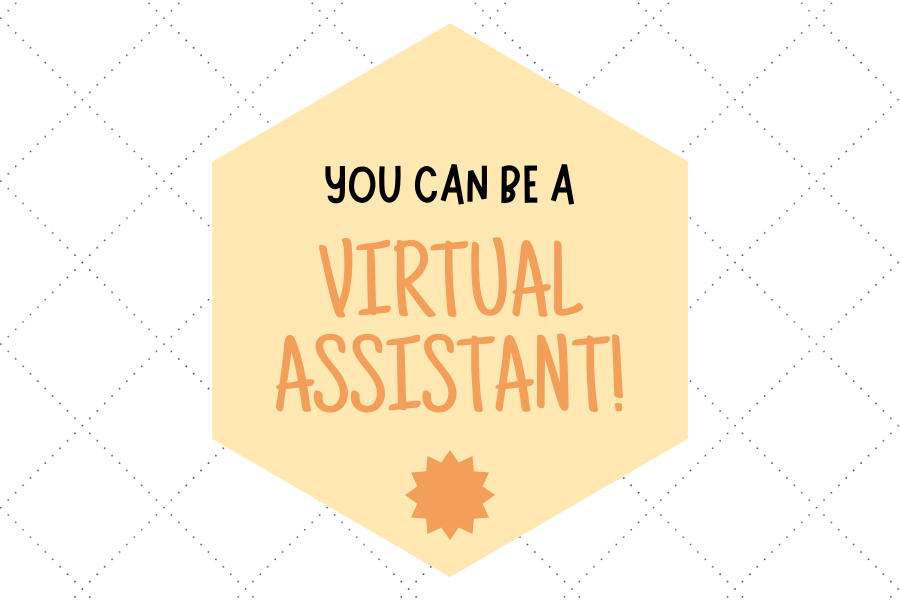
Step 3: Market your business
Congratulations on reaching Step 3 of starting your successful virtual assistant (VA) business! Now that you’ve chosen your niche and developed your skills, it’s time to spread the word and attract clients.
Here’s your answer to the question: How do I get VA clients?
Marketing is essential for any business, but it’s especially important for VA businesses because you’re competing against other VAs from all over the world.
Effective marketing also plays a crucial role in establishing your brand and building a client base. Let’s dive into some practical tips to help you market your business and stand out from the crowd.
- Define Your Unique Selling Proposition (USP): Your USP is what sets you apart from other virtual assistants in the market. Identify your strengths, skills, and what makes your services unique. Are you an expert in a specific software or industry? Do you offer personalized attention or have a quick turnaround time? Highlight your USP in your marketing materials and communication with potential clients.
- Create an Engaging Website: Your website serves as your virtual storefront. Make sure it reflects your professionalism and showcases your services. Use clear and concise language to communicate the value you provide. Include a captivating bio, testimonials, a list of services, and contact information. Don’t forget to optimize your website for search engines using keywords like “setting up a successful VA business” and “profitable niches for VA businesses.”
- Use Social Media: Social media is a great way to connect with potential clients and promote your business. Choose platforms where your target audience is active and create engaging content that provides value. Share tips, insights, and success stories related to your niche. Engage with your audience by responding to comments, answering questions, and participating in relevant groups and discussions. Make sure you stay active on social media and that you’re sharing interesting and relevant content.
- Network Within Your Niche: Networking can open doors to new opportunities and referrals. Join industry-specific groups, attend virtual conferences or webinars, and participate in forums where your target audience congregates. Connect with fellow VAs, business owners, and influencers in your niche. Build genuine relationships by offering support, sharing insights, and collaborating on projects.
- Offer Freebies or Trial Sessions: Consider providing a freebie or taster session to potential clients. It could be a free consultation, a downloadable resource, or a trial period for your services. This allows potential clients to experience your skills and the value you bring. Impress them with your expertise and professionalism, and they’ll be more likely to become paying clients.
- Write blog posts: Writing blog posts is a great way to establish yourself as an expert in your field and attract new clients. Make sure your blog posts are informative and helpful, and that they’re relevant to your target audience.
- Guest blog: Guest blogging is a great way to get exposure to a new audience. When you guest blog, make sure you write high-quality content that’s relevant to the blog’s audience.
- Offer discounts: Offering discounts is a great way to attract new clients. When you offer discounts, make sure they’re relevant to your target audience and that they’re time-sensitive.
- Run contests: Running contests is a great way to generate excitement and interest in your business. When you run contests, make sure the prizes are relevant to your target audience and that the rules are easy to understand.
- Ask for Testimonials and Referrals: Happy clients are your best brand ambassadors. Request testimonials from satisfied clients and showcase them on your website and social media platforms. Additionally, ask your clients for referrals. Word-of-mouth recommendations can be incredibly powerful and help you attract new clients.
Remember, marketing is an ongoing process, and what works for one person may not work for another. Experiment with different strategies, track your results and adjust your approach accordingly. As you take the next steps to start a VA business, remember to stay authentic and consistent in your marketing efforts, and you’ll steadily grow your client base.
In the next step, we’ll explore the importance of managing your time effectively as a VA. This includes valuable insights and tips to help you maintain a healthy work-life balance!
Step 4: Manage your time effectively
Once you’ve started getting clients, it’s important to manage your time effectively. This is especially important for VAs who often work with multiple clients at the same time.
And as a Christian mom who values family and wants to make the most of her time, mastering time management is crucial. It’s one of the most important steps to start a VA business.
There are many different ways to manage your time effectively. Here are a few tips:
- Prioritize with Purpose: Start by identifying your top priorities in both your personal and professional life. Ask yourself: What tasks are essential for growing my VA business? What family commitments need my attention? Knowing your priorities will guide your time allocation and help you make intentional decisions.
- Create a Schedule That Works for You: Every mom has her own unique rhythm, so create a schedule that aligns with your family’s needs. Establish specific work hours and communicate them with your loved ones. This way, everyone knows when it’s time to focus on business, and when it’s time to enjoy those precious family moments.
- Embrace the Power of Time Blocking: Time blocking is a game-changer when it comes to productivity. Divide your day into blocks of time dedicated to specific tasks or activities. For instance, designate a block for client work, another for personal appointments, and one for family fun. Sticking to this structured schedule helps you stay focused and minimizes distractions. Just remember, block scheduling is a busy mom’s best friend.
- Delegate and Outsource: Supermom, it’s time to accept that you can’t do it all alone! Delegate tasks that others can handle, allowing you to focus on what truly matters. Consider hiring a virtual assistant or outsourcing certain tasks, such as administrative work or social media management. This way, you can devote more time to growing your business and cherishing quality moments with your loved ones.
- Equip Yourself with Productivity Tools: Technology can be a mompreneur’s best friend! Explore productivity tools that streamline your work and keep you organized. Project management platforms like Trello or Asana help you track tasks, while time-tracking apps like Toggl ensure you stay on top of your schedule. With these tools in your arsenal, you’ll conquer your to-do list like a pro.
- Prioritize Self-Care: Remember, you’re the heart and soul of your VA business, so taking care of yourself is non-negotiable. Create a morning routine and schedule regular self-care activities and breaks throughout your day. Whether it’s savoring a cup of coffee, taking a brisk walk, or indulging in a relaxing bubble bath, make time for activities that rejuvenate your mind and soul.
- Communicate and Set Boundaries: Open communication is key when balancing work and family. Talk to your family about your work schedule and expectations. Involve them in age-appropriate tasks and teach them the value of respecting your designated work hours. By setting clear boundaries and fostering understanding, you’ll create a harmonious balance between your business and family life.
By implementing these time management strategies, you’ll dance through your days with grace and efficiency. Remember to embrace the journey and celebrate your wins, big or small. You’re doing an amazing job building your VA business while keeping your family at the center of it all!
In our next step, we’ll delve into the importance of building strong relationships with your clients. Get ready to nurture those connections and take your VA business to new heights!
Step 5: Connect and Thrive with Your Clients
As a Christian mom who values connection and authenticity, fostering meaningful client relationships will not only enhance your business but also bring joy and fulfillment to your work. So, let’s dive in and discover some down-to-earth tips for building those valuable connections!
- Be Approachable and Friendly: Your clients should feel comfortable reaching out to you, so be approachable and friendly in your interactions. Respond promptly to their messages, emails, or calls with warmth and enthusiasm. Show genuine interest in their needs and concerns, making them feel heard and valued.
- Communication is Key: Effective communication forms the foundation of any successful client relationship. Be clear, concise, and professional in your written and verbal communications. Listen attentively to your clients’ instructions and ask clarifying questions to ensure you understand their expectations fully. Regularly update them on project progress, and be transparent about any challenges or delays.
- Offer a Personal Touch: Inject a little bit of your personality into your interactions to make clients feel connected to you on a personal level. Share fun anecdotes, use humor when appropriate, and genuinely celebrate their successes. This personal touch will create a warm and friendly atmosphere that fosters long-term relationships.
- Exceed Expectations: Go the extra mile to wow your clients with exceptional service. Deliver high-quality work that not only meets but exceeds their expectations. Surprise them with little unexpected extras or thoughtful gestures that demonstrate your commitment and dedication to their success. By consistently surpassing expectations, you’ll earn their trust and loyalty.
- Show Appreciation: Expressing gratitude is a powerful way to nurture client relationships. Thank your clients for their trust in your services, and acknowledge their contributions to your business. Send personalized thank-you notes or small tokens of appreciation on special occasions. These gestures go a long way in fostering a sense of camaraderie and building lasting connections.
- Seek Feedback and Act on It: Regularly seek feedback from your clients to gauge their satisfaction and identify areas for improvement. Embrace constructive criticism with an open mind and a willingness to grow. Act on the feedback received and make necessary adjustments to provide an even better client experience in the future.
- Maintain Professionalism: While building relationships with your clients, it’s important to maintain professionalism. Respect deadlines, honor confidentiality agreements, and adhere to professional standards. Treat every client interaction with the utmost professionalism and integrity.
Remember, building strong client relationships takes time and effort. Focus on creating connections based on trust, authenticity, and a shared commitment to success. By embodying these principles and genuinely caring about your clients, you’ll not only foster loyal partnerships but also experience the joy of serving others in a meaningful way.
In our next and final step, we’ll recap the key points of our journey and offer some final thoughts and advice for Christian moms considering starting a VA business.
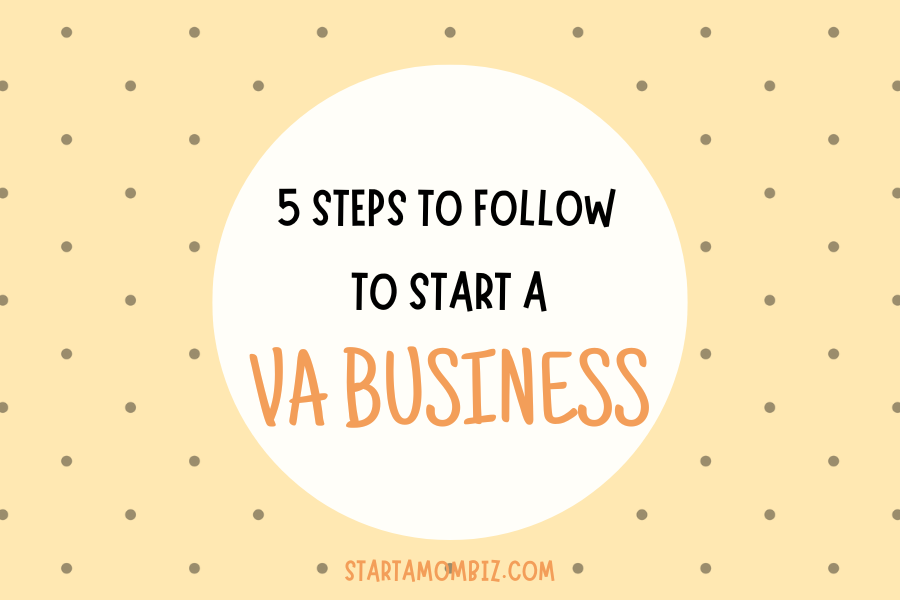
Summary of the Steps to Start a VA Business
Congratulations on completing the steps to start a VA business! You’ve taken a big step towards creating the life you desire as a Christian mom who values family and wants financial independence. By following these steps, you’re well on your way to setting up a successful VA business that aligns with your values and priorities.
Remember, finding your niche and developing your skills are vital components of your success. Take the time to explore profitable niches for VA businesses and identify the ones that resonate with you the most. Continuously invest in your personal and professional growth to stay ahead in this competitive market.
As you begin setting up your VA business, remember the importance of marketing your services to attract clients. Use the power of social media, networking, and word-of-mouth referrals to showcase your unique offerings. Remember, you have the skills and determination to succeed in this industry.
Don’t forget the importance of managing your time effectively and building strong client relationships. These factors will help you achieve long-term success as a VA business owner. Embrace your journey, remain open to learning and growing, and always put your family first.
With these steps to start a VA business as your foundation, the possibilities are endless. Stay focused, determined, and true to your vision. Your hard work and dedication will pave the way to a thriving VA business that allows you to enjoy the flexibility, fulfillment, and financial stability you desire.
Bonus Step: Setting up a successful VA business
To effectively market your virtual assistant (VA) business and attract clients, you’ll need a range of promotional tools. Here are some essential ones to consider:
- Your website: Your website is your online home base, so it’s important to make sure it’s well-designed, informative, and easy to navigate. Be sure to include your contact information, a list of your services, and testimonials from past clients.
- Social media: Social media is a great way to connect with potential clients and share your expertise. Be sure to create profiles on the most popular social media platforms, such as LinkedIn, Facebook, and Twitter, and use them to share blog posts, articles, and other helpful content.
- Email marketing: Email marketing is a great way to stay in touch with potential and current clients. Be sure to send out regular newsletters with updates about your business, new services, and special offers. And include an email signature that stands out.
- Business cards: Business cards are a great promotional tool for virtual assistants. They are small and portable, so you can easily hand them out to potential clients at networking events, conferences, or even just in passing. Business cards should include your contact information, a brief description of your services, and your logo.
- Content marketing: Content marketing is a great way to establish yourself as an expert in your field. Write blog posts, articles, ebooks, and other helpful content that will appeal to your target audience.
- Welcome kit: You can create a welcome kit for new clients that includes a proposal, your services, and prices, as well as a client roadmap.
To help you get started right away in your business, I’ve created a VA Business Bundle that includes all of these promotional items and more!
VA Business Bundle

This all-in-one bundle includes the following resources to help you quickly start a thriving VA business:
- Website – get an easy-to-customize Canva website for VAs that can be launched in Canva for free—no coding skills required! This website is fully customizable to your brand colors and fonts.
- Client Welcome Package – includes a welcome message, About page, review of the process, what to expect, billing and finance, invoice, client proposal, timeline, and more!
- Lead Magnet – Create an eBook on your area of specialty in order to establish yourself as an expert in your field.
- Client Roadmap – outlines the goals and objectives for a client relationship. It typically includes information such as the client’s needs, the services that will be provided, the timeline for implementation, and the expected outcomes.
- Services and prices – outline your services and prices in a branded guide.
- Email signature – design a memorable email signature to use in your email marketing campaigns.
- Instagram posts – create branded Instagram posts to use in your social media marketing.
All of these templates are editable in Canva with a free account. Grab your copy of this VA Business Bundle and start your VA business today!
Just click the button below to get your VA Business Bundle.
FAQs on Steps to Start a VA Business
Many people wonder how much it costs to start a virtual assistant business. The cost of starting a virtual assistant business can vary depending on your needs and location. However, you can expect to spend anywhere from $100 to $2,000 to get started.
Here are some of the expenses you can expect to incur as you take the necessary steps to start a VA business:
Computer and internet access: A good computer and a reliable internet connection are essential for any virtual assistant. You can expect to spend anywhere from $500 to $1,000 on a new computer, and $50 to $100 per month on internet access.
Office supplies: You’ll need some basic office supplies, such as a printer, paper, pens, and stapler. You can expect to spend around $50 on these supplies.
Software: There are a number of software programs that can be helpful for virtual assistants, such as project management software, CRM software, and email marketing software. You can expect to spend anywhere from $50 to $500 on software.
Marketing: You’ll need to market your business to potential clients. This can be done through online marketing, networking, and cold calling. You can expect to spend around $100 per month on marketing.
Once you’ve covered your initial expenses, you’ll need to budget for ongoing costs, such as:
Self-employment taxes: As a self-employed individual, you’ll be responsible for paying self-employment taxes. These taxes are typically around 15% of your income.
Health insurance: If you don’t have health insurance through your employer, you’ll need to purchase your own health insurance. This can be a significant expense, depending on your coverage needs.
Retirement savings: You’ll need to start saving for retirement as soon as possible. You can do this by contributing to a traditional or Roth IRA, or by opening a self-employed 401(k).
The cost of starting a virtual assistant business can be intimidating, but it’s important to remember that you can start with very little money. By carefully budgeting and planning, you can get your business off the ground without breaking the bank.
Here’s a brief summary of how to get VA clients:
1. Define your niche.
2. Build a strong online presence.
3. Network with other VAs and business owners.
4. Offer a free consultation.
5. Be patient and persistent.
Selling yourself as a VA is about effectively communicating your value, building trust, and delivering exceptional service. To effectively market your services, consider the following key points:
1. Define Your Unique Value: Identify your unique skills, experiences, and strengths that set you apart from other VAs.
2. Craft a Compelling Pitch: Develop a concise and persuasive pitch that clearly communicates the value you offer.
3. Showcase Your Portfolio: Create a portfolio that showcases your past work and accomplishments.
4. Build an Engaging Online Presence: Establish a professional website and optimize your social media profiles.
5. Network and Collaborate: Attend industry events, join relevant online communities, and actively network with potential clients and fellow professionals.
6. Offer a Free Consultation: Provide a free consultation or discovery call to interested clients.
7. Deliver Exceptional Service: Exceed client expectations by providing high-quality work, meeting deadlines, and maintaining clear communication.
Incorporate these tips along with the others in your steps to start a VA business.
Yes, a virtual assistant (VA) business can be profitable. As you take the Steps to start a VA business, just remember the profitability of a VA business depends on various factors, such as the niche you specialize in, the rates you charge, the number of clients you have, and the level of demand for your services.
Grab your copy of the all-in-one VA Business Bundle which includes all the resources you need to quickly start a profitable VA business.
Pin for later:
